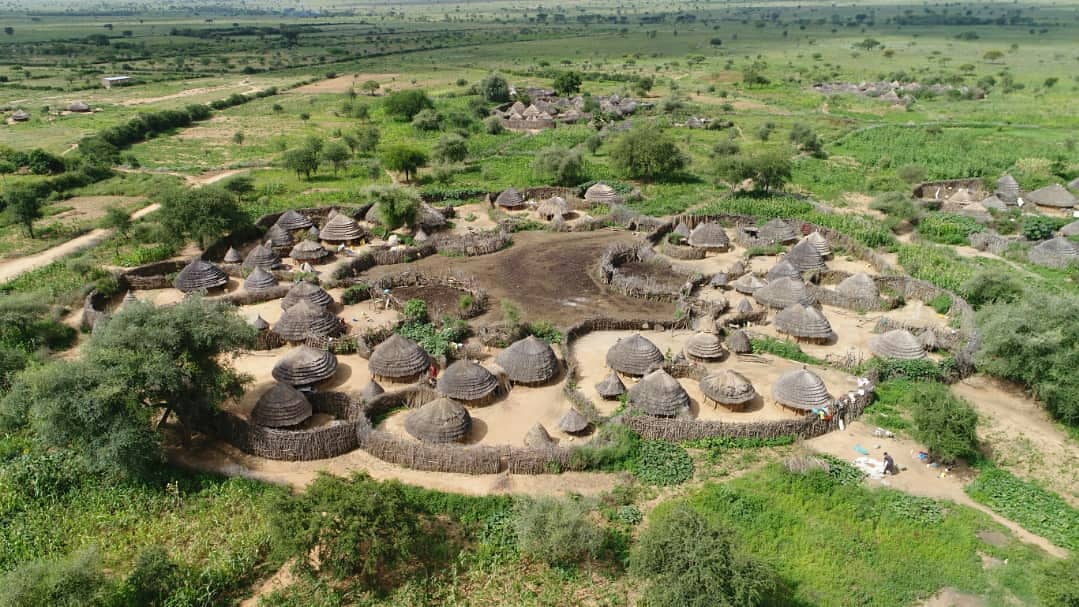Ngakarimojong
Ngakarimojong: Village, Household and Family
The peoples of northeastern Uganda, northwestern Kenya, South Sudan and southern Ethiopia who speak Ngakarimojong are almost universally pastoralists who rely primarily on animal husbandry for their subsistence. Some Ngakarimojong speakers, like the Turkana of Kenya, are fully nomadic, leading a transient lifestyle that rarely sees them in one place for very long. The Ngakarimojong-speaking peoples of northeastern Uganda’s Karamoja region, on the other hand, practice semi-nomadic transhumance, maintaining permanent villages even as young men and boys travel long distances with their livestock during the dry season in search of water and pasture. This migratory lifestyle has created unique sets of norms governing the organization of communities, households and family units. Below are a selection of terms, some of which are derived from the Jie dialect, crucial to understanding the basic elements of social organization among the semi-nomadic Ngakarimojong speakers of northeastern Uganda.
Ere (plural: Ngireria): homestead
- The ere is the fundamental building block of Jie society. Usually translated as “homestead,” the ere represents a single family unit and the livestock it possesses. More literally, it can refer to the home, consisting of multiple separate enclosures and compounds, inhabited by the family, known colloquially as a manyatta. An ere is presided over by its most senior male member and is inhabited by his wives, children and, sometimes, other relatives such as siblings or cousins.

Ekaal (plural: Ngikaalia): home/compound
- Ekaal refers to an individual compound or home within the ere. Each ekaal is the domain of one of the wives of the senior man in the family, which she inhabits along with her children and over which she exerts total control. Each ekaal contains at least one akai, or house.
Ekapolon (plural: Ngikapolok): leader/important man
- The term ekapolon often refers to the male head of the ere, and in that context is sometimes translated as “owner” (i.e. ekapolon a ere: owner of the homestead). However, it can be used in a variety of contexts and can refer to politicians, war leaders (ekapolon a ajore), or simply important men in a community.
Members of the household:
- Ekile (plural: Ngikilyok): man/husband
- Aberu (plural: Ngaberu): woman/wife
- Ikoku (plural: Ngidwe): child
- Apese (plural: Ngapesur): girl
- Edia (plural: Ngidiain): boy
- Lokaato (plural: Ata lokaato): brother
- Nakaato (plural: Ata nakaato): sister
- Papa (plural: Ata papa): father
- Toto (plural: Ata toto): mother
- Papaa (plural: Ata papaa): grandfather
- Tata (plural: Ata tata): grandmother
- Ekedunyet (plural: Ngikedunyeta): visitor
- Kaya (plural: Ngikayeyai): cousin
Arii (plural: Ngarii): livestock enclosure/kraal
- The Arii the kraal at the center of every ere, where the family’s livestock is kept at night, and is the economic heart of the family and its primary source of social and economic capital.
Awii (plural: Ngawiyoi): migratory kraal
- The dry seasons spent in the awii are a crucial component of the lives of Jie men and boys, in which they form bonds with their peers and learn the intricacies of he pastoral lifestyle. The term awii refers to the kraal as well as all the herdsmen and animals inhabiting it. In the awii, herdsmen sleep in small temporary huts called ngitogoi (singular: etogo).
Alomar (plural: Ngalomarin): fortified kraal
- In times of war, Jie ngawiyoi band together to form ngalomarin, or large, fortified kraals composed of an amalgamation of several different ngawiyoi and their herdsmen and livestock. An alomar is usually under the strict command of a respected war leader.
Etem: hearth
- The etem is a communal meeting place where members of an ere or an entire village gather in the evenings to spend time together and discuss important matters.
Akiriket (plural: Ngakiriket): shrine/sacred grove
- Each of the 14 clans of the Jie has its own akiriket, where male elders congregate to discuss important community matters and carry out ceremonies and religious rituals. Ngakiriket are central to the identities and social, political and spiritual life of the Jie people, who typically inhabit clan-based villages.
Lopae (plural: Ata lopae): bond friend
- Bond friendship is a highly important institution in traditional Jie society, in which men form close reciprocal relationships with one another. Bond friends are expected to provide each other with livestock in times of hardship, help each other pay the bride price if they are seeking to get married, and open up their homes to one another. Today, lopae is also used as a casual way of referring to one’s peers (sort of like “bro” or “dude” in English).
Asapan: age set/generation set
- The age and generation set system is central to Jie social organization, dividing Jie men into social groups based on seniority and establishing crucial links between men and communities within the decentralized structure of Jie society.

